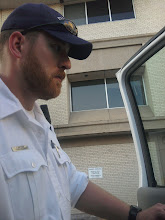Not like the brazen giant of Greek fame,
With conquering limbs astride from land to land;
Here at our sea-washed, sunset gates shall stand
A mighty woman with a torch, whose flame
Is the imprisoned lightning, and her name
Mother of Exiles. From her beacon-hand
Glows world-wide welcome; her mild eyes command
The air-bridged harbor that twin cities frame.
"Keep, ancient lands, your storied pomp!" cries she
With silent lips. "Give me your tired, your poor,
Your huddled masses yearning to breathe free,
The wretched refuse of your teeming shore.
Send these, the homeless, tempest-tost to me,
I lift my lamp beside the golden door!
(Emma Lazarus, 1883)
-----------------
"The patient in room 234 is ready when you are."
"Okay." The chief resident turns to me. "Do you know how to gown and glove?"
The hospital where I went to school is a Level 1 trauma center, major academic institution, and "safety net" hospital located in the American West. It is responsible for providing many things to this city. The expertise and experience necessary to make booksmart students into fine doctors, nurses, respiratory therapists, psychologists, medical professionals of every stripe. Public health resources for the entire city, especially for its indigent population. And of course, through its EMS system, solving problems - many different kinds of problems - for people whose situations, whatever they may be, have exceeded their ability to manage them. All this, and much more. In fact, let's call it "Golden Door" Hospital, after the poem written by Emma Lazarus to adorn the base of the Statue of Liberty. It has certainly seen the huddled masses, the wretched refuse, and the homeless.
The fact that Golden Door Hospital is a teaching hospital is significant, and it's hard to describe how unless you're in the business. Before I got into medicine, I worked in the blue-collar trades, and not the skilled ones really. A lot of general labor, landscaping, small engine repair. I've done some carpentry, some HVAC, I was in forestry for a while, and guided backcountry trips. In a workshop, or on a jobsite, you can usually walk up to an elder or more experienced coworker and go "Hey, can I try that?" or at least "Can you show me how to do what you're doing?" It's not the same with medicine. Welding pipes together doesn't have quite the gravitas inherent in messing around with people's bodies, and it takes a while to get used to the idea of watching somebody stick a needle into another human being and wanting to go "Hey, can I try that?"
Physicians especially hold a special place in our society, mostly because we let them do things to us that we would never let anybody else do. Fill us full of multiple strange chemicals (not always the fun kind, either). Take parts of us out and put other parts in. Cause us physical, visceral pain in the name of relieving our suffering. Sometimes we tell them things that we don't tell our families, our lovers, or our closest friends. Your doctor holds a singular place in your life, and not everybody can be that person. Doctors know that, and some can be protective of the role.
But at Golden Door Hospital, doctors are also protective of the brotherhood of their trade. They are serious about passing on its secrets and its arcane rituals to new initiates. Because they know that nobody can be that person without being shown how. So when you walk into a room there, and a doctor is, say, delivering a baby, she is likely to understand your position as a novitiate in the guild, because that is how she got to where she is today. A sacred position in a unique priesthood, and that's no joke: she is one who ministers to the ill and injured.
What a paramedic does is a little different. We have usually a year of specialty schooling, not four plus a residency. Hell, I don't even have a college degree. We don't have the holy instruments at our disposal, not all of them anyway. And we go where most doctors don't: into people's bedrooms and bathrooms, destroyed cars and crime scenes. But we need to do the same exact things that the doctor does: figure out what's wrong with you, try and figure out why, and try to make it better. Doctors at Golden Door know this, and they treat paramedic students accordingly. They don't let them do everything all the time, in accordance with their position. But the good ones know how much of the faith is our province as part of the laity.
"Yes, ma'am, I'm competent in sterile technique."
"Good. Gown and glove, and put your hands where my hands go."
We walked into the room together, dressed in the robes of our order. They're seafoam green scrubs. Just like at Mass, some folks watched us carefully as we enter, and some turned their heads; everybody was quite silent. In front of the curtain were a dozen family members of the patient. Every emotion imaginable was on one face or another. Excitement, fear, guilt, anxiety, shame, pride, confusion. On the other side of the curtain, in a bed: a very pregnant fifteen-year-old girl with her knees way up in the air, naked from the waist down, and very near to delivering her baby. Her mother holding her hand, and they're both looking pretty nervous. We put on our sterile gear and the chief resident sat in a chair between the girl's legs.
"Okay, come sit next to me. Ready?"
About as ready as I'm liable to get.
"Put your hands where my hands go."
And that is the story of how I wound up with my hands - both of 'em - inside a fifteen-year-old's vagina. This is one of the ways we minister to the people.
Wednesday, August 15, 2012
Subscribe to:
Posts (Atom)
